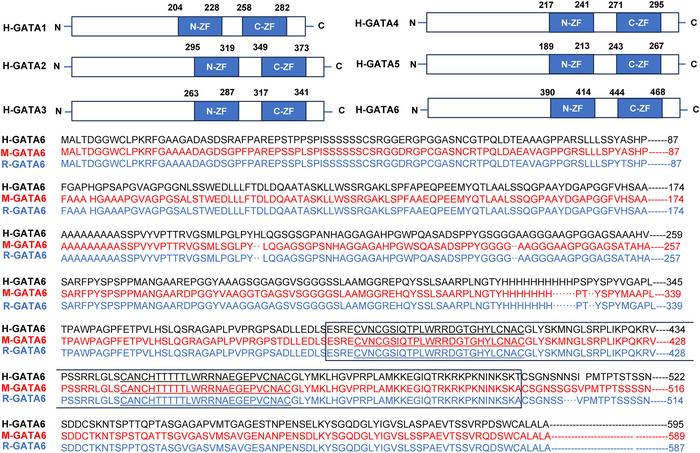
Exploring the Intricacies of GATA6 in Pancreatic Ductal Adenocarcinoma
The field of cancer research is ever-evolving, uncovering new insights into the mechanisms underlying tumor progression and response to treatment. Recent discoveries regarding the transcription factor GATA6 have shed light on its significant role in pancreatic ductal adenocarcinoma (PDA), a particularly aggressive form of pancreatic cancer. This article delves into the multifaceted functionalities of GATA6, emphasizing its importance not only as a key player in tumor biology but also as a prospective biomarker for patient stratification and therapeutic targeting.
Pancreatic cancer remains one of the most lethal malignancies, characterized by late-stage diagnosis and limited treatment options. With a five-year survival rate of a mere 5%, understanding the molecular players involved in PDA is paramount for developing more effective treatments. GATA6, known for its role in regulating gene expression during development and cellular differentiation, has emerged as a crucial factor in the progression of PDA, influencing various signaling pathways that govern tumor behavior.
One of the most striking revelations is the dualistic nature of GATA6 in cancer progression. Research has demonstrated that the expression levels of GATA6 can significantly impact tumor differentiation and patient outcomes. Elevated levels of GATA6 are associated with well-differentiated tumors that tend to have a better prognosis, while diminished expression is linked to basal-like PDA, which exhibits aggressive traits and is notoriously resistant to conventional chemotherapy regimens.
The implications of these findings extend beyond mere association. Through comprehensive research methodologies, it has been established that GATA6 participates in numerous oncogenic pathways, including Wnt, Notch, Hedgehog, TGF-β, and VEGFR signaling networks. By modulating these pathways, GATA6 influences key cellular processes such as proliferation, apoptosis, and epithelial-mesenchymal transition (EMT), thereby shaping the tumor microenvironment and enhancing tumor survival.
Moreover, GATA6 serves a critical role in maintaining epithelial differentiation within pancreatic tumors. This differentiation is crucial for preventing dedifferentiation and metastasis, two processes that are hallmarks of aggressive cancer phenotypes. Interestingly, while GATA6 overexpression can lead to tumor promotion under specific contexts, it simultaneously functions to uphold the characteristics of well-differentiated epithelium, acting as a paradoxical guardian against cancerous transformation.
As researchers seek to translate these fundamental insights into clinical practice, the potential of GATA6 as a biomarker gains traction. Patients exhibiting low levels of GATA6 may represent a distinct subgroup of PDA that is more likely to resist conventional therapies. This perspective drives the rationale for investigating individualized therapeutic strategies tailored to the molecular profile of tumors, facilitating the emergence of precision medicine in oncology.
In addition to identifying GATA6 as a potential diagnostic tool, investigations reveal that GATA6-deficient tumors exhibit poor responses to standard chemotherapy regimens such as FOLFIRINOX. However, intriguing evidence suggests that these tumors might respond favorably to targeted therapies that leverage the EGFR pathway, highlighting the necessity of personalized treatment regimens based on GATA6 status. This pivot towards individualized approaches promises to enhance patient outcomes and improve survival rates in a field that has long been marred by dismal prognoses.
Considering the profound impact of pancreatic cancer, which accounts for approximately 7% of all cancer-related deaths, further research into GATA6 is not just beneficial but essential. By deepening the understanding of GATA6’s role in PDA, scientists can begin to unravel the complexities underpinning tumor behavior and treatment resistance. The call for additional clinical trials is paramount, as validating GATA6’s utility as a predictive biomarker and therapeutic target could revolutionize treatment paradigms in pancreatic cancer.
Furthermore, the research underscores the importance of interdisciplinary collaboration in the fight against cancer. The insights gained from studying GATA6 integrate molecular biology, genetics, and clinical oncology, providing a holistic view of tumor dynamics. As the biological underpinnings of cancer become better understood, the potential for developing novel therapeutic interventions increases, offering hope to patients and clinicians alike.
In conclusion, GATA6 stands at the forefront of pancreatic cancer research, embodying a beacon of hope for understanding and targeting PDA. The intricate balance of its oncogenic and tumor-suppressive roles reveals the complexity of cancer biology, reinforcing the idea that precision in treatment is warranted. As we advance towards optimizing therapeutic strategies, it is imperative that researchers remain vigilant in exploring the multifactorial nature of cancer-related gene expressions, paving the way for improved prognostic outcomes and enhanced patient care in the ever-challenging landscape of pancreatic cancer.
By illuminating the pathways influenced by GATA6 and its implications in chemotherapy resistance, the research sets the stage for future investigations that will ideally lead to refined diagnostic and therapeutic options tailored to individual patient needs, fundamentally transforming the treatment landscape for pancreatic ductal adenocarcinoma.
Subject of Research: GATA6 in pancreatic ductal adenocarcinoma (PDA)
Article Title: Exploring the Intricacies of GATA6 in Pancreatic Ductal Adenocarcinoma
News Publication Date: TBD
Web References: TBD
References: TBD
Image Credits: TBD
Keywords: GATA6, pancreatic cancer, PDA, biomarkers, chemotherapy resistance, targeted therapies, precision medicine.
Tags: biomarkers for patient stratificationcancer treatment advancementsGATA6 as a therapeutic targetGATA6 in pancreatic cancermolecular mechanisms of pancreatic cancerpancreatic cancer survival ratespancreatic ductal adenocarcinoma researchrole of GATA6 in tumor differentiationsignaling pathways in PDAtranscription factors in cancertumor biology and progressionunderstanding aggressive pancreatic cancer





